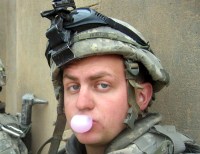
Alex Horton, in Iraq
By Alex Horton, Official VA Blogger
Rain had transformed Baghdad’s many unpaved roads into one giant muddy sinkhole, and the engine of a Stryker vehicle moaned in a failed effort to escape. The vehicle sunk under the weight of its armor and required a tow. The driver and vehicle commander leapt to the ground to attach towing cables to the front, only to discover they weren’t shin-deep in mud—they were stuck in an open sewer. One of them had to completely submerge himself to get to the tow hook. When it was over, both men were covered head to toe in jet-black ooze and sprayed down by a benevolent Iraqi in her courtyard. The worst part of that day? It was Christmas Eve, and surely one we’d remember.
The holiday muck fest is one of my favorite stories to tell civilians. Even though it’s repulsive, it doesn’t have an ounce of violence. No one had their limbs torn away from their bodies. No rendition of Taps swept over a memorial service to mingle with recollections of the dead. Everyone comes out okay in the end, albeit a bit filthy. My Christmas story humanizes my fellow soldiers in a way many of my other stories can’t.
Underneath our helmets and body armor and grenades primed to sling shrapnel, we were young men in an absurd situation pulling a vehicle out of human waste. After I tell civilians that story, or countless others, they no longer think of Iraq as a place measured by half-minute segments on the nightly news or in column inches of a newspaper. For a moment, they are there with me; their nostrils twinge and their shoulders bend under the weight of ammunition and ceramic plates.
They usually say, “I can’t even imagine.” I’m secretly grateful they even try.
Stories and recollections are at the foundation of our social existence. Listen to any group of people talking, and soon enough you’ll hear something like “That reminds me of a funny story. . . .” or “That’s like the time when. . . .” Most connections are shared over common experiences, like 21st birthday parties or misadventures in a college dorm.
But not since the Revolutionary War have so few citizens engaged in sustained conflict. Veterans of all wars not only carry the burden of a decade of combat, but they do it out of view of the rest of the nation—inside military bases and in living rooms among their families. Some carry the load alone at the bar or at the bottom of a pill bottle, or too many times, on a park bench. Sometimes years of service—medals and promotions and countless stories—are condensed to two lines on a resume that far too often gets tossed in the garbage.
The latest numbers for Iraq and Afghanistan veterans show high unemployment compared to the overall rate; while overall unemployment has dropped to nine percent, 12.1 percent of recent veterans are jobless. Thousands of vets of all eras will sleep under bridges, in back alleys, and on couches tonight.
Are we, as a nation, apathetic to veterans? I don’t think so. But to accept them back into society, we must move away from supporting our troops only during encounters in an airport or glimpses during halftime at football games. Veterans come home feeling different and odd because their minds have not caught up with their bodies. They return to the states in fragments; in stories and laughter over photo slideshows and war souvenirs clutched tightly. Those unforgettable moments of a deployment laid bare between two people can help heal the trauma of war.
The impact of stories depends on the generation from which they come. Nearly a thousand World War II veterans die each day, and with them, tangible slivers of history. Korean War veterans like my grandfather, are now into their 70s. I cherish the stories he has told me throughout the years. How he received his Purple Heart; why he chose to be in a machine gun squad (because they carried just a holster on road marches). He has lessons to tell of a war as fierce as it is forgotten. Pretty soon, his stories will only live on in photographs, or stories passed down through my family like ancient rituals.
Veterans Day 2011 will come and it will go, but stories like these, among veterans of all generations, will remain, waiting to be let out.
I can’t quite place why I’m willing to share so many of my war stories with civilians. Some of my friends keep their service hidden and move on, like the Army and the war were scenes from a long forgotten movie. Not me, though. Perhaps I’d rather think of myself in a moment in time where I didn’t quite know how those stories would shape my life after the war. Or why I stumble madly in the dead of night to double check the locks that keep out enemies without form or figure.
In a fractured existence of countless stories, I still watch the Stryker labor in the muck under its own weight; I see gunships in the distance burp heavy fire and hear the delayed chatter of the guns; I feel the savage fury overtake me as a friend is stuffed into a body bag. I can’t escape the grinding machinery of the present, no matter how bafflingly unpredictable and scary and bizarre it is compared to war. But each story I tell puts those moments to rest. If we come home in fragments, it’s the stories that make us whole again.
Alex Horton is a public affairs specialist at the U.S. Department of Veterans Affairs, where he writes for the department’s blog, VAntage Point. He is also an English major at Georgetown University in Washington. He served for 15 months as an infantryman in Iraq with the Second Infantry Division. Follow him on Twitter: @AlexHortonVA


